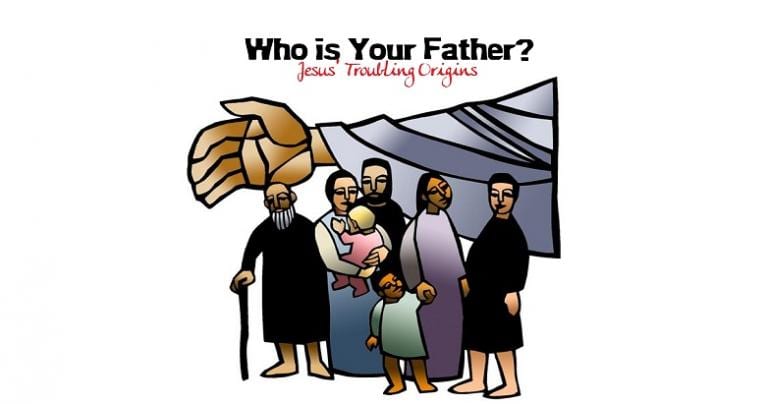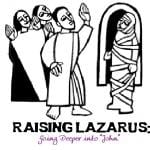
Paternal lineage is the chief way how Israelite males derived their honor-rating, but what happens when the public is unsure about it?
Paternal lineage granted Biblical males their ascribed honor. The subject of paternal lineage is on display in John 8, where Gospel readings have been drawn the past few days in our lectionary. The chief way you get your honor in the Bible is just by being born. Honor is everything in the Bible. Honor means the claim to worth and the public’s acknowledgement of that claim. Failure or refusal to recognize the honor claim results in shame or dishonor.
Not everyone who encountered Jesus back in the first century shared the honorable opinion his followers had of him. Honestly, very few shared the notion revealed to visionaries of the Risen One—that he was Messiah and Cosmic Lord. And what of our Christian assessment bearing theological freight of centuries? We rightly say of him that he is “God from God, light from light, true God from true God, begotten, not made, consubstantial with the Father,” but who in the first century Jesus groups would make such lofty claims?
The earliest Jesus groups were keenly aware and, frankly, embarrassed by Jesus’ humble, “nothing-person” origins. Indeed, they were also aware of his shameful origins and pedigree. It amounted to this—“Who exactly was Jesus’ father?” Throughout Jesus’ life and ministry, the paternal question loomed.
Paternal Problem & Stereotyping
In the Bible it is always, “like father, like son,” or “like mother, like daughter.” You see, ancient peoples, like our biblical ancestors in the faith and their enemies, believed that by closely observing the behavior and character of someone, you could deduce from that alone (with assurance!) that person’s genealogy. Therefore if you behaved like a snake in the dirt, you were definitely gennēmata echidnōn, that is, the illegitimate offspring of snakes, like Jesus and John the Baptist asserted about their adversaries—“snake-bastards” (see Matthew 3:7-8; 23:33).
How come lowly village peasant artisan didn’t behave accordingly? He was going around like he was a holy man doing all sorts of socially deviant things! Therefore his enemies used all this as ammunition with which to hurl insults at Jesus.
In the Mediterranean world from which our Bible and Church comes, stereotypes are reliable guides for judging persons. The Bible comes from a culture that is anti-introspective. Forget about psychological profiles, emphasizing personhood and looking inward, and anything Freudian or Jungian like Myers-Briggs tests and Enneagram nine-type descriptors. That’s all unintelligible to the world of the Scriptures and when applied to them is always an ethnocentric anachronistic violence, an invasive abuse of the texts.
Paternal Lineage was Just One Way to Stereotype
In stark contrast to the 21st century West, in the world of Jesus you know people via social categories. Biblical characters and authors were collectivists, not American individualists! There, you are your place (“Nazareth” or “Galilee” = NOTHING-places). You are your family (Joseph the peasant village artisan = NOTHING person. On the positive side, at least Jesus was male and quite old (dying around 30, in terrible health-conditions, nutrition and hygiene, 80 percent of his peers would have been younger than he was)! Were Jesus female or young, there would be nothing for Mediterranean authors to write about.
Since in the Mediterranean Biblical world your identity was always stereotyped by group-identity, any labels your ingroup acquired encoded the social information needed to know you. That’s why, biblically speaking, Cretans are always “liars, vicious beasts, lazy gluttons” (Titus 1:12). And nothing worth listening to can come out of Nazareth (John 1:46) and Galilee (22:59; Luke 23:6; John 7:52), nothing-places, right?
Notice how often people assess who Jesus is through stereotyping in the Fourth Gospel. It’s like, if you know his family and where they live, you can make an absolutely solid picture of who he is. The enemies of Jesus think it’s a piece of cake to know all there is relevant about Jesus through simply referencing his lineage. Again and again this is seen in “John” where even his closest associates are baffled by his origins (see John 6:42; 7:27, 34; 8:14; 9:29; 13:36; 14:4; 16:5; 19:9).
Even More Lowly…
If Jesus were just the village peasant son of a village peasant artisan, that would make him lowly enough in honor rating. But it was worse than that, and people knew it. The document called “Mark” is the earliest Gospel we have. That makes it the oldest—
Mark 6:2-3
When the sabbath came he began to teach in the synagogue, and many who heard him were astonished. They said, “Where did this man get all this? What kind of wisdom has been given him? What mighty deeds are wrought by his hands! Is he not the artisan, the son of Mary, and the brother of James and Joses and Judas and Simon? And are not his sisters here with us?” And they took offense at him.
Picture the Markan Jesus in the Synagogue, in his home village, Nazareth, nothing-place filled with nothing-people. What the hell is a village artisan doing teaching there? This is bad enough, and it does wow the men there. But it offends them also. Look at what they call him—the son of Mary. Is that how males get identified in the Middle East, in a matrilineal way?
Paternal or Maternal?
Note how the author of Sirach speaks of himself—
Sirach 50:27
Wise instruction, appropriate proverbs, I have written in this book—I, Yeshua Ben Eleazar Ben Sira—as they poured forth from my heart’s understanding.
As Ben Sira says abovem the proper Israelite way you identify someone is through the patriline, not matriline. Unlike later Jewishness, ancient Israelite identity was patrilineal instead of matrilineal. In the Bible the right way to identify someone is through his father, not mother. So, given that, why do you think that the Nazarene males would call Jesus “the son of Mary” instead of the father’s name?
What if I told you that it was because they were not sure who Jesus’ father was?
That everyone knew, through the gossip network, that Mary had mysteriously become pregnant before living with her husband is something that likely haunted Jesus his whole life. Likely, the unknown, anonymous author we call “Mark” has preserved this sad memory.
Consider this in light of the topic of discussion in John 8. Watch the video and discuss below…











